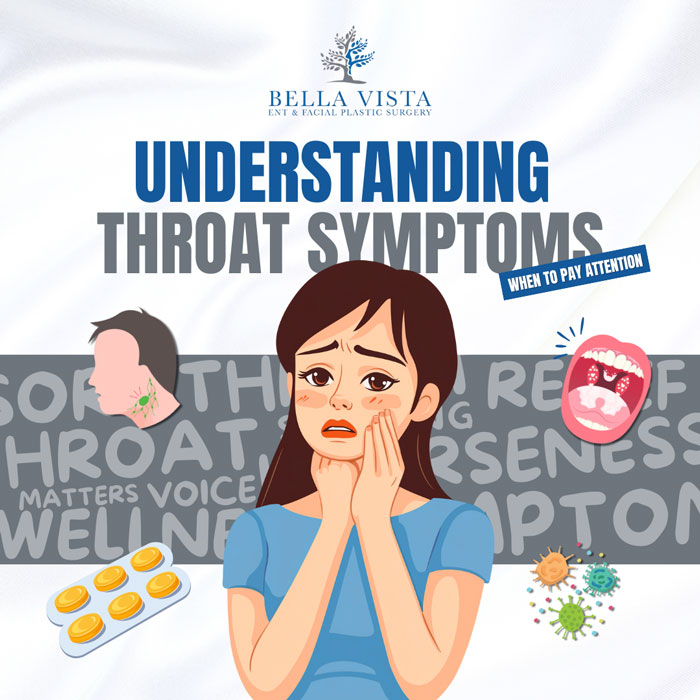Understanding Throat Symptoms: When to Pay Attention
That persistent tickle in your throat, the occasional difficulty swallowing, or that morning hoarseness that lingers throughout the day—these seemingly minor throat issues often exist in that uncertain space between “probably nothing” and “should I be concerned?” Bella Vista ENT is here for you. Your throat is remarkably complex, serving as both a vital passageway for breathing and eating while also housing the intricate mechanisms that produce your voice.
When something feels off, it can affect your comfort, communication, and overall quality of life in ways that only those experiencing it truly understand. Whether you’re a teacher whose voice is your professional tool, a parent whose sore throat makes reading bedtime stories difficult, or simply someone tired of that nagging sensation when you swallow, recognizing when throat symptoms warrant attention empowers you to take appropriate action at the right time.

Common Throat Symptoms and What They Mean
Your throat can react to many different things, from allergies and infections to acid reflux and irritation. Here are some of the most common symptoms and what they might indicate:
1. Sore Throat
A sore throat is often caused by a viral infection, like the common cold or flu. Other possible causes include:
- Strep throat – A bacterial infection that causes redness, swelling, and sometimes white patches in the throat.
- Allergies – Postnasal drip from allergies can lead to throat irritation.
- Dry air – Breathing in dry air, especially during winter, can make your throat feel scratchy.
A sore throat that lasts more than a week or comes with a high fever, trouble swallowing, or swollen lymph nodes may need medical attention.
2. Hoarseness or Voice Changes
Losing your voice or having a raspy sound when you speak is often due to:
- Overuse – Talking, singing, or yelling too much can strain your vocal cords.
- Laryngitis – An infection or irritation that causes swelling in the voice box.
- Acid reflux – Stomach acid can travel up and irritate the throat, leading to hoarseness.
If your hoarseness lasts more than two weeks without an obvious cause, it’s best to get it checked out.
3. Constant Throat Clearing
Feeling like something is stuck in your throat or needing to clear it all the time can be caused by:
- Postnasal drip – Mucus dripping down the back of your throat due to allergies or a sinus infection.
- Acid reflux – Reflux can cause irritation that makes you feel like there’s a lump in your throat.
- Throat irritation – Smoking, pollution, or strong odors can cause constant throat clearing.
If this symptom doesn’t improve or gets worse, it may be a sign of an underlying issue.
4. Trouble Swallowing
Having occasional difficulty swallowing when you eat too quickly or don’t chew properly is normal. However, frequent or worsening swallowing problems could be caused by:
- Tonsillitis – Swollen or infected tonsils can make swallowing painful.
- Acid reflux – Long-term reflux can lead to swelling in the esophagus, making it harder to swallow.
- Nerve or muscle problems – Some conditions can weaken the muscles needed for swallowing.
If you have ongoing trouble swallowing or feel like food is getting stuck, it’s important to get it checked out.
5. A Lump or Swelling in the Throat
Feeling a lump or swelling in your throat can be caused by:
- Swollen lymph nodes – These often swell during infections but should go back to normal within a few weeks.
- Thyroid issues – An enlarged thyroid gland can cause a lump in the front of the neck.
- Growths or nodules – Some lumps may need further testing to rule out serious conditions.
If a lump lasts more than two weeks or keeps getting bigger, it’s best to see a doctor.
When to See a Doctor
While many throat symptoms are mild and go away on their own, you should seek medical attention if you experience:
- A sore throat lasting more than a week
- Trouble swallowing or breathing
- A lump in your throat that doesn’t go away
- Hoarseness lasting longer than two weeks
- Frequent throat infections or strep throat
Paying attention to your throat health can help prevent bigger problems. If something feels off and doesn’t improve, it’s always better to check with a doctor.
Your Voice Matters: The Path to Throat Wellness
Your throat symptoms are more than just physical discomfort—they’re messages from your body worth understanding. At Bella Vista ENT, we view our relationship with patients as a collaborative partnership, acknowledging that you bring valuable insights about your own body’s signals.
Remember that early intervention often leads to simpler solutions. Listen to your throat. It’s trying to tell you something, and sometimes, that something deserves professional attention. Your future comfortable, healthy self will thank you for paying attention now.
